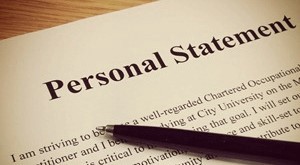Tom Slatter, Senior Insights, Impact and Systems Manager at The Brokerage, shares his experience of supporting young people prepare their personal statements and explores where they are an outdated system that disadvantages young working class people.
March 2022

‘I’ve done another version of my personal statement, sir,’ Cem* said, handing me a USB stick containing his 18th draft. He was determined to get into a top university and his personal statement was going to be perfect.
It is almost 6 years since this exchange, but I remember it vividly. I hadn’t told him to do so many drafts, I thought it wasn’t going to get better past the 4th, but there was no stopping him. He knew he didn’t have the CV that other applicants would have and was determined to put the best spin he could on his experiences. And while Cem was an outlier, it was not unusual for prospective undergrads at the inner London schools I worked with to write multiple drafts and sweat over the minutest details of their personal statements.
Why might this be a problem? Getting into the best universities is competitive and it’s good for students to put the effort in isn’t it? No, not when it is wasted effort. Leaving aside the structural problem of why some universities are ‘better’ than others (a state of affairs not found in many other countries), personal statements simply do not warrant the effort many young people put into them.
There are several reasons for this. One is that many universities do not pay close attention to what is written in them. The most important factor universities look at is the young person’s predicted grades, not their statement. The statement might be ignored entirely, or put through a cursory grammar and spelling check at most institutions.
At those institutions who do look at personal statements there is another problem. As Lee Elliott Major, Professor of Social Mobility at Exeter university, has recently suggested “statements have become a systematic disadvantage to poorer students”.
Young people from working class backgrounds are far less likely to have access to the support mechanisms their richer counterparts do. Whether from parents or through schools and tutors, there is a wealth of help available for the children of the better off when it comes to structuring a personal statement. Such young people are also more likely to have benefited from access to formal work experience programmes and other experiences to write about (an issue touched upon here by England cricketer Matt Prior in relation to the high costs of participating in the sport).
Through my work in social mobility charities I’ve helped to provide some similar support to those from working class backgrounds. If working class young people are to compete, such support is needed.
One young woman I supported, Sally*, was applying for engineering courses. Her initial draft indicated that she had no relevant experience to speak about. It was only through a discussion that I was able to tease out of her that she often helped out with her father’s business and that this business was involved in the building trade, doing work with sheet metal. Seeing the connection and realising that any work experience counted, not just formal work experience programmes, took support from me. It was a ten minute conversation that improved her chances of getting into the course she aspired to, but providing that support to every potential undergraduate student in a sixth form is a significant amount of staff time. The charity I was working for was able to provide support for a handful of schools, but this is not replicated around the country.
I would not argue that it should be. Instead I would suggest that universities need to think about how they recruit. Here at The Brokerage we often support companies in rethinking their recruitment practices. One important principle in this work is the idea that companies should create equitable selection methods that allow underrepresented young people to share and contextualize their strengths. This might be as simple as providing specific questions focussed on the skills and attributes you are looking for, rather than open ended personal statements that assume the young person already knows what you are looking for. A more advanced approach might be to reconsider the entire recruitment process, swapping out competency based interviews for a more strengths or scenario focused approach.
The higher education sector could apply the same principles to their recruitment processes, replacing statements with individual questions, or simply removing them entirely, as well as moving the application period to after A level results day.
The support I gave to individual students helped to make a difference to those individuals — both Cem and Sally made a successful transition to university — but until there is change in the system we are unlikely to see university admissions reflect the make-up of the wider UK population.
*names have been changed.
While I have your attention, The Brokerage helps young people learn about and access professional careers. We do this by helping young people develop their knowledge and skills, for example through mentoring and masterclasses with our partner companies. We also recruit for various apprenticeships, internships and graduate schemes. If you know any young people between the ages of 16 and 25 who might be interested, please refer them to our website.



 '
'